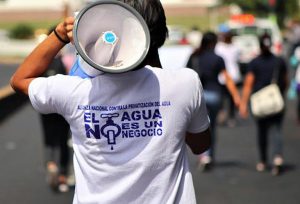EL SALVADOR: Dirty Water and Dirtier Profits
 For nearly two months, the environmental movement, the left-wing Farabundo Martí National Liberation Front (FMLN) and El Salvador’s leading public water utility workers’ union have been criticizing President Nayib Bukele’s administration for its seeming indifference to the foul-tasting, fetid brown water that began spurting from faucets throughout the capital city of San Salvador in early January, affecting the water of 2.5 million people in the greater San Salvador area.
For nearly two months, the environmental movement, the left-wing Farabundo Martí National Liberation Front (FMLN) and El Salvador’s leading public water utility workers’ union have been criticizing President Nayib Bukele’s administration for its seeming indifference to the foul-tasting, fetid brown water that began spurting from faucets throughout the capital city of San Salvador in early January, affecting the water of 2.5 million people in the greater San Salvador area.
Tap water in El Salvador hasn’t been safe to drink for decades due to severe contamination; most Salvadorans either use a filter or buy bottled water. When water quality began to worsen in early January, Bukele’s Minister of Health, Ana Orellana, stunned many in the country when, on January 18, she said the situation could be resolved by simply boiling the water before consuming it. The day before, Frederick Benítez, the president of National Aqueduct and Water Supply Administration (ANDA), whom Bukele appointed in June, asserted that “a proliferation of algae in [the] Lempa [river] caused this phenomenon” but that “[the water] is not harmful to health.”
But not everyone was buying the government’s explanation. The independent magazine Gatoencerrado found Benítez’s declaration to be false, given the high concentration of heavy metals in the water. And the largest ANDA Workers’ Union (SETA), challenged the administration’s explanation in a statement: “The contamination did not have to do with the proliferation of microalgae, as the authorities have argued. Instead there was a political decision to violate the treatment protocol at the Las Pavas Water Treatment Plant and thus supply the population with poor quality water.”
After first requesting and ultimately having to subpoena both Benítez and the Minister of Health to come before the Assembly, Benítez gave testimony to the legislature, admitting that “drinking the water was not recommended.”
In a radio interview, FMLN legislator Dina Argueta spoke out against the “attitude of the new government, not only of the minister of health and the president of ANDA, but of all the officials.” Citing the similar refusal of the president of the Port Authority (CEPA) to appear before the Public Works Commission.
In addition, the National Alliance against Water Privatization, a coalition of environmental, faith, labor and community organization, denounced the government’s decision to purchase and distribute bottled water as a solution to the crisis, given that bottled water companies already profit from the poor quality of water in El Salvador and bear responsibility for El Salvador’s water scarcity in the first place.
Bukele has used the issue of water contamination to reiterate his support for the construction of a water treatment plant at Lake Ilopango, deeming it necessary given the severe water scarcity, despite numerous studies concluding that the water at the lake is unsuitable for human use, even after treatment. Numerous outlets have reported that Bukele is in talks with China to finance construction of the plant as part of a major infrastructure investment plan.
The current crisis in San Salvador comes in the midst of a national debate about who will manage El Salvador’s fragile water resources.
The environmental movement and the FMLN have been promoting a General Water Law since 2012 which would enshrine public management of water and the human right to water into law. But in 2018, the right-wing parties introduced legislation to the Environment and Climate Change Commission that would have created a national water regulation agency where the majority of decision-making seats would be held by the private sector.
The Water Forum, a coalition of local, environmental and religious groups, is concerned that the recent, dramatic deterioration in water quality could be “a strategy to represent public management as inefficient, since it happened the same week that the General Water Law came up for debate in the Legislative Assembly. So if people hear about public water management and are experiencing an ordeal with ANDA, they might be inclined to support the privatization of water.”
Indeed, as all of this was unfolding, the right-wing parties began debate on a new regulatory framework in the Environmental Commission. As the National Alliance Against the Privatization of Water explained, “people are bound to get suspicious when, in the midst of a crisis, the Bukele administration, bottled water companies, the Salvadoran Chamber of Commerce (ANEP), the sugarcane industry, real estate developers and the right-wing president of the Environment Commission Martha Evelyn Batres decide to hurriedly pass a law regarding the regulation of water.”
Verónica Marroquín, a member of the FMLN political committee, similarly expressed, “We are totally against privatization. We also have our questions regarding this crisis, because the Right uses cases like these to make their arguments, to put the issue of privatization into discussion again.”
Towards the end of January, Bukele urged his cabinet to create a “National Water Plan” in which “we solve the water issue in all its facets.” However, Bukele’s national budget for 2020, which the right-wing majority legislature approved in December 2019 without the votes of the FMLN, cut ANDA’s funding by $7.5 million compared to 2019, the FMLN’s last year in the presidency. Notably, ANDA’s funding for Environmental Sanitation and Water Security was cut by 65%.
Although has Bukele apologized for the delay in addressing the crisis, his repeated emphasis on inviting private sector investment to El Salvador, cuts in funding to public institutions like ANDA, and promotion of environmentally-risky infrastructure projects suggest that crises like this will continue to worsen in the months and years to come.
Source: The Committee in Solidarity in Solidarity with the People of El Salvador, February 20, 2020
